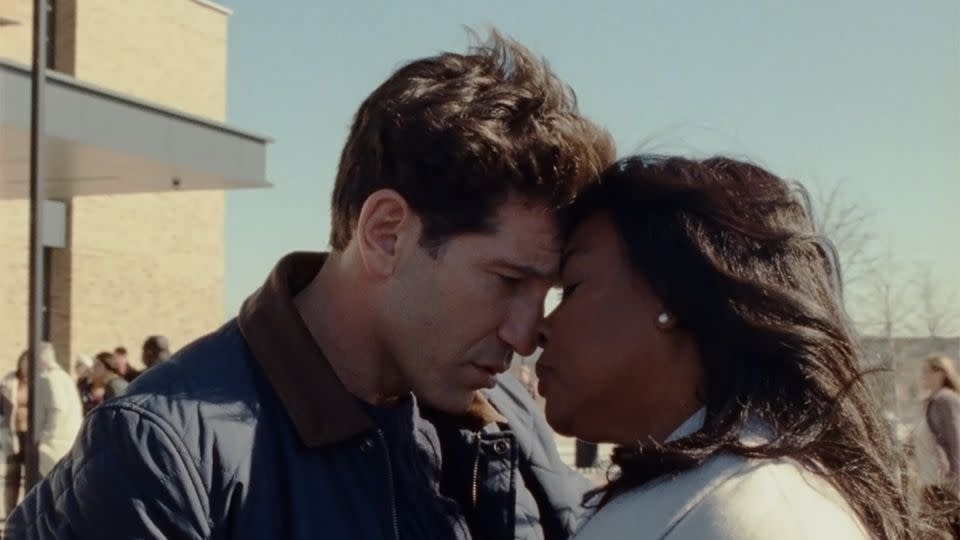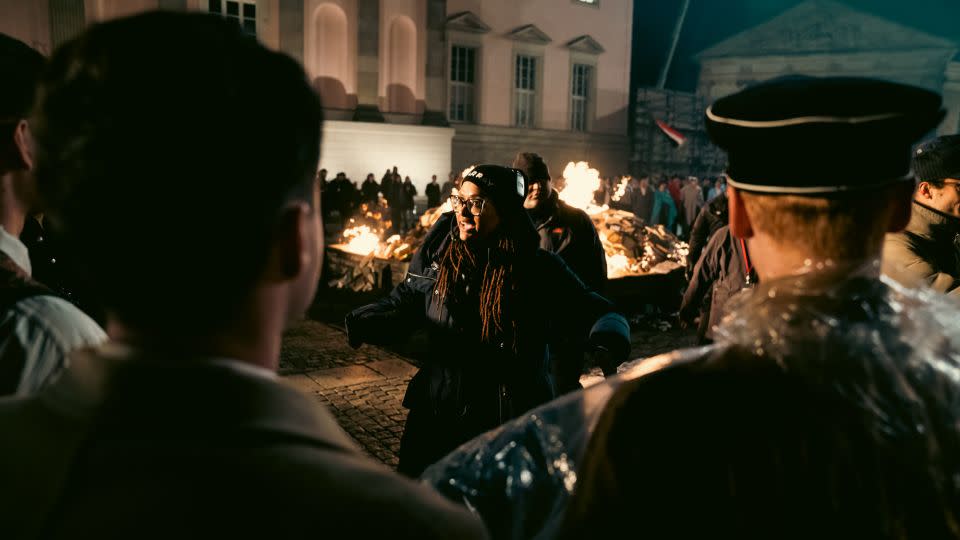Ava DuVernay on her ‘rebellious and radical’ new film ‘Origin’ and the ‘caste system of Hollywood’
- Oops!Something went wrong.Please try again later.
- Oops!Something went wrong.Please try again later.
“We were told, ‘You probably shouldn’t do that.’ ‘That’s not going to work.’ But we did it anyway.”
Ava DuVernay is smiling, but there’s a steeliness to her words. The director, writer and producer is no stranger to carving her own path. With “Origin,” her latest film, she was forced to dig in a little deeper.
An adaptation of bestseller “Caste: The Origins of Our Discontents,” the book by Pulitzer Prize-winning journalist Isabel Wilkerson makes the case it is not race but the structures of caste that best explain social inequality. Using the United States, India and Nazi Germany as examples, “Caste” was a non-fiction sensation when it was released in 2020, namechecked by Barack Obama, temporarily banned by a library in Texas, and the source of fierce debate. But you’d be hard-pushed to say the 500-page work of social anthropology had “film” written all over it.
And yet for DuVernay, the appeal was obvious. Her filmography has sought to reckon with the history and present realities of American inequality, injustice and oppression (see: “Selma,” “The 13th,” “When They See Us”). To do so, DuVernay has flitted between documentary and narrative fiction as she saw fit.
Her latest film represents the confluence of her talents, blending historical re-enactments, narrative fiction and surreal imagery in a roving journey through the mind of Wilkerson as she forms her thesis. DuVernay has bent the medium of cinema to realize “Origin,” and may have collected a few naysays perturbed by her narrative invention, but for others it’s a thrilling piece of hybrid filmmaking, breaking late into the awards season picture.
DuVernay’s cast are clearly in awe.
“I thought it was the most beautiful piece of work she has ever done,” said newly-minted Emmy winner Niecy Nash-Betts, a long-time collaborator who plays Wilkerson’s cousin Marion.
“I didn’t think there was any path in the world to take that book and make it into a movie,” said Jon Bernthal, who plays Brett, Wilkerson’s husband. “I’m so blown away by not only how she did it, but the fact that she did it in such a singular way, and in such a lonely way. She raised the money herself. She built that film herself – it’s an absolutely Herculean effort.”

“Origin” began life at Netflix before DuVernay split and pivoted to independent financing (the film is distributed in the US by Neon).
“It was made in 37 days on three continents by two Black independent producers and no studio,” DuVernay told CNN. “It has a cast of actors in it who would not be the kind of cast that a studio executive would sign off on. It’s rebellious and radical in a lot of ways, separate and apart from the content itself, and that is because it doesn’t fit into the caste system of Hollywood.”
Carrying the film is Aunjanue Ellis-Taylor as Wilkerson. An Oscar-nominee for “King Richard,” the actor cited the all-too-familiar image of white male genius on screen.
“I’ve seen it done. But I wanted to see someone that looks like me doing it,” she said. “Our thoughts and ideas can be the beginnings of a movement and the beginnings of a language, and that’s what’s portrayed here.”
In the film, Wilkerson is coaxed into action after hearing a tape of George Zimmerman calling 911 before he shot and killed Trayvon Martin (in press notes, DuVernay said the production used the real audio). Husband Brett encourages her to keep going with her research, which takes the journalist into the past and around the world. DuVernay transports audiences to the Middle Passage, the Third Reich, the segregated US South and newly-independent India. Many scenes are confronting, laden with sorrow, demonstrating the many facets of caste. A Jewish woman is torn from her lover and interned in a concentration camp; a Dalit man in Delhi cleans an open sewer with his bare hands; a Black child lies on an inflatable bed on an empty, White-only swimming pool, banned from touching the water. All the while, Wilkerson is coping with personal losses of her own.
“(Ellis-Taylor’s) performance is so unbelievably beautiful,” said Bernthal, “to take something like this sociological philosophy and present it in a way that’s human and harrowing and that doesn’t feel like medicine.”
Brett is a small part but Bernthal “jumped at the chance to be a part of it,” he said. “I really wanted to play somebody who is completely in awe of his spouse, who really felt that she had this singular ability. To be in awe of your spouse is something I understand deeply – it’s my relationship with my own wife.”

The idea of holding and empowering others leapt out of the text and on to the set, said Nash-Betts.
“Because we were making a film about this idea of caste, this system of hierarchy, (DuVernay) wanted to do away with that on set,” she said. “Instead of it being camera A and camera B, let’s just make it ‘east’ and ‘west’ … She took intentional time to go and speak with our background actors every day to just connect with them.”
“Caste is everywhere, particularly in the entertainment industry, which is a very pronounced and unashamed hierarchy,” said DuVernay. “It’s difficult to navigate, to learn, but also to come in from the outside and to try to make your way through. To thrive is less of the goal, it’s more to just survive in the entertainment industry.”
Bernthal agreed that caste is everywhere in the industry.
“I’ll tell you,” he said, “the greatest filmmakers I’ve ever worked with are all so wildly different, but they all have one thing in common: they absolutely pulverize the system of hierarchy on set. Good ideas can come from anywhere. Everyone is involved. Everyone feels like they’re 100 feet tall.”
“All the ones that are mediocre do the exact opposite. They constantly talk about, ‘Well you’re this and you’re this.’ ‘Hey, be quiet, stay in your lane.’ When we cling on to these things that are built from our own insecurities and fears and our own sense of worthlessness … it’s not only an unbelievable waste of time, it literally holds back the entire system.”
The reason DuVernay moved “Origin” away from Netflix was partly a matter of timing. The streamer had reportedly eyed a 2025 release, but the director wanted the film out well ahead of the 2024 US election. It figures then that DuVernay believes cinema does not just reflect the world, but can affect it too.
“I am the kind of filmmaker that believes that art has the capacity to change the world,” the director said. “I’m a filmmaker so I can make films. But in all of our lives, in any given situation, by asking the uncomfortable question, raising your hand when something is said that’s objectionable, inquiring further into misinformation – any aspect of how we’re dealing with current times – we can change the outcome by the way we behave.”
“I hope that ‘Origin’ contributes to that conversation,” she added.
She undersells herself. Rather than hope, DuVernay has done everything in her power to make sure of it.
“Origin” is released in cinemas the US on January 19, and on February 2 in the UK.
unknown content item
-
For more CNN news and newsletters create an account at CNN.com

